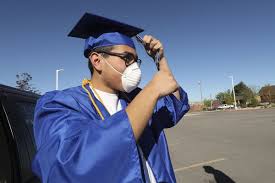Life After High School In the Time of COVID-19
- Admin
- May 23, 2020
- Career and Majors, Education News, Ivyboost Updates
- 548

COVID-19 has dramatically changed the way we live our lives, and no one really knows what “normal” is going to look like when the shelter in place orders and social distancing guidelines are lifted. Will we continue to use handshakes as formal greetings? When will it feel normal to eat in a restaurant again? But the biggest question for many high school students is what college is going to look like in the upcoming years.
Cambridge University, one of the most well-respected and elite colleges in the world, recently announced that it will not hold in-person classes again until at least mid-2021. Their entire fall semester will take place completely online, with the exception of some small tutorials that are able to comply with social distancing. The California State University system has made the same decision for it’s twenty-three campuses that serve nearly half a million students. And while some universities, like Purdue and Notre Dame, have pledged to return to in-person instruction it is unclear what impact the pandemic will have on campus culture. These changes have many students re-thinking their plans for the immediate future. Should they try to wait it out and take a year off before beginning their undergraduate careers? Should they start at lower-cost, closer to home schools and then transfer? Or should they just accept the uncertainty and enroll as planned? There’s no right answer, but high school students and their families should undoubtedly explore their options.
While abroad programs are unlikely to be fully operational by the fall, students who decide to postpone college for a year still have many options for how to fill their time. Americorps has over 75,000 positions across the country in fields ranging from conservation to education and disaster relief available to people looking to commit to a year of full-time service. Participants are paid a living stipend which makes this an excellent choice for young people looking for valuable work experience as well as the chance to live independently. Those planning to embark on a gap year also have the option to find work close to home in the fall in order to save money to finance travels that are more likely to be feasible in early 2021. Organizations like Where There Be Dragons charge fees to provide unique, eye-opening, and fully planned programs and already have a schedule of programs starting in 2021. For a lower cost travel option, WorkAway connects travelers with hosts who are looking for people to help out around their farms, homes, or businesses in exchange for room and board.
Many American schools emphasize their campus culture as a major selling point that helps to justify the higher price tags of elite private schools. This argument is less compelling now that schools are either going virtual or planning major changes to campus life in the fall. Meanwhile, community college, while always a great option for continuing education, has become even more appealing. It is much cheaper than starting at a four-year school and presents an opportunity for students to get intro classes, which would take place in impersonal lecture halls at most schools, out of the way. If students are going to be taking classes from home, it makes sense for those classes to cost less. Plus, the digital aspect presents an opportunity for students to explore community colleges that are slightly farther away from their homes. If a student is interested in psychology, maybe they want to look into a college down the coast that has a highly renowned faculty member. After a year or two, when things are more back to normal (hopefully), students will be able to transfer to their choice of school, likely having had a similar education to that of their peers who start at four-year colleges, but without the associated debt.
Going to college is exciting. Some students might not want to put off the campus experience, even if it is going to be dramatically different from what they had initially expected. Given that most schools have not yet decided what to do about the fall semester, it’s completely possible that freshmen will be permitted to live in dorms and eat at mediocre dining halls. It’s just going to be more complicated. Students will likely face shortened semesters that end around Thanksgiving to reduce travel. They might have to wear masks outside of their dorms, their classes may be split between virtual and in-person, or their professors may be behind plexiglass. Large sporting events that bolster school spirit might not be viable. It’s unclear what freshmen (and other returning students) are going to be walking into, but there is no doubt that it will give students a wholly unique, unprecedented college experience.
